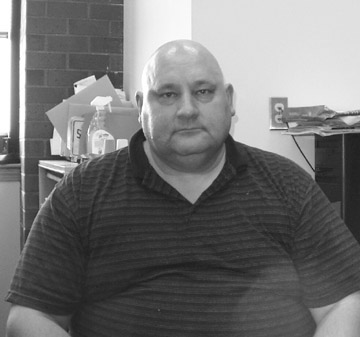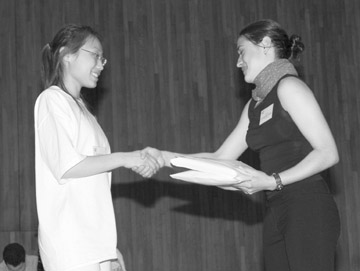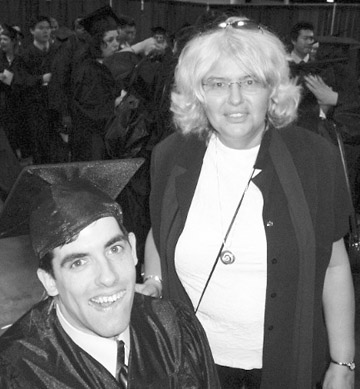Web Exclusive – UMass President Comes To Harbor Campus
January 29, 2004
As many students were wrapping up their last day of classes, Jack M. Wilson was starting his first meeting with high-level UMass Boston officials and taking part in a student luncheon.
Interim President Jack M. Wilson listening to a student speak during the chancellor’s luncheon.
Wilson, the interim president while the UMass Board of Trustees searches for a replacement for William M. Bulger, met with senior administration officials and students, as well as faculty members and deans from the College of Science and the Graduate College of Education. The day was capped with a tour of the new Campus Center, which is quickly nearing completion.
The interim president has visited the campus an estimated twenty to thirty times in the last year, but counts this as the first time he visited in a “systematic way.” He has been visiting other campuses in the UMass system, appearing at the Dartmouth branch several days before coming to UMass Boston.
In a brief interview with The Mass Media, while touring the Campus Center, Wilson told of how there was no typical day for the president of UMass, “because every day you do something different.”
“And that’s one of the reasons I like it,” he said. “Because, you know, one moment, you might be touring a beautiful building like this, and the next, you’re sitting and talking to a legislator about why they should invest in the students of the Commonwealth, and the next moment you’re sitting with a corporate exec, trying to explain to them why they should get involved with the University of Massachusetts, and then you’re dealing with a group of irate faculty members who are irate for whatever reason, or irate students, or irate you know, it just happens, it’s part of life, it’s a big community.”
His experience has been “extremely positive,” because people have pulled together in the face of budget cuts, he said. “Everywhere I go, I get support. I see people who are doing good, hard work, great jobs, making things happen, and that’s what it’s all about.”
Wilson remained coy as to whether he was in the running to permanently succeed President Bulger, who stepped down in August after nine months of controversy over his Congressional testimony and opposition to Governor Mitt Romney’s higher education reorganization plan.
“We’ll have to see how that plays out,” said Wilson. “I mean, that’s a complicated process. The search committee is working away, I’m having a lot of fun, and I guess we’ll all know by spring.” The search committee recently met behind closed doors, coming out only to announce that the field will be narrowed to ten or twelve candidates in January and that a final pick is expected in February or March.
STUDENT LUNCHEON
Joined by Chancellor Jo Ann Gora and Vice Chancellor of Student Affairs J. Keith Motley, President Wilson talked about UMass Boston, the UMass system, and his experiences as president over shrimp and chicken at a student luncheon while soliciting responses and reviews from students from various walks of campus life.
Students listen to President Wilson speak over shrimp and chicken.
Wilson told the small group of transfer, freshmen, older, and traditional students that he was “having a ball” as interim president of UMass.
In turn, all the students introduced themselves and talked of their experiences at UMass, good and bad.
One sophomore student spoke of her “really good experiences” at UMass Boston, as well as of the people on campus of different ages and from different countries. She said that when she had been accepted, she had been initially skeptical because of the lack of dorms, adding that she currently lives off-campus in Harbor Point.
Interim President Wilson and UMass Boston Chancellor Jo Ann Gora at the luncheon.
“Someday, I think we’ll probably want dorms here,” Wilson said, adding that dorms don’t mean a change or detraction in the school’s mission, and can be seen as an enhancement instead. The “spirit of student cohesiveness” is difficult without them, he said. The prospect of dorms has proved a hard climb for the university, with a wide swath of opposition coming from some members in the surrounding communities, the legislature, and in the university itself, arguing that the urban mission is in danger of being forgotten, and a long-ago promise between the university and community being ignored.
Another student, who said she was graduating right before her son’s twentieth birthday, praised the online courses offered, saying she had had classmates from New Jersey and Spain. But she noted the “great irony” of being unable to register online for online courses.
President Wilson, who came to the university system two years ago and started UMass Online before going on to become Vice President for Academic Affairs, said they were working to fix that, but budget cuts over the last two years had knocked it off track.
Maureen Murphy, a retired insurance worker who volunteers for Norwell’s Council on Aging and who has never been to college before, expressed concern about support in the college for older students. Starting next semester, students aged sixty and over will no longer be able to waive their fees, the result of a recommendation by a cost-cutting university committee earlier this year. The Gerontology Program is expected to be the hardest hit.
Chancellor Gora took up the question, saying she knew it was a hardship for seniors, but adding that the implementation had already been delayed one semester, and tuition was still waived. It’s unfortunate that there’s been a change in policy, she said, but that’s what happens when the budget gets cut.
CAMPUS CENTER TOUR
Inside the Campus Center, Wilson looked up at the high ceilings and marveled at the marble walls.
Wilson and Associate Vice Chancellor for Administration and Finance Stephan Chait, who’s in charge of the project, stroll underneath the Campus Center’s new light fixtures.
“Gorgeous, gorgeous,” he murmured as Assistant Vice Chancellor of Administration and Finance Stephan Chait took him through all four floors, from the entrance to the ballroom, of the university’s new “front door,” located at the back of the campus.
Chait and Wilson making their way up to the second floor of the six-story Campus Center.
Wilson, taking a look at the layout and its offices without doors, compared it to a building he worked in while a member of the American Association of Physics Teachers, which is part of an American Institute of Physics. The group had moved into the new building from New York to Washington, D.C.
“It was set up just like this,” he said, stating that it was meant to be inexpensive, airy, and bring light into the entire building. “I like it.”
Chait (right) shows off the Campus Center’s atrium to Wilson.
When Chait noted that there were some complaints about the lack of doors, Wilson acknowledged it would take some getting used to, and that it was part of the change, saying that when he moved to the new building, people had the same concerns. Some students and staff members have raised questions about the lack of doors and a possible loss of privacy, as well as whether it will be easily accessible for students with disabilities.
The Campus Center will transform the campus, Wilson said. “The campus deserves it. The students of this campus deserve it. It’s a statement that they’re important, and they can be anything they want to be.”
WILSON MEETS COLLEGE DEANS, FACULTY
Earlier, Wilson met with the newly appointed deans of the College of Science and the Graduate College of Education, and was briefed on the various initiatives coming out of them.
Provost Paul Fonteyn revealed in a slideshow the strategic plans for UMass Boston to become Massachusetts’ public urban research university by “build[ing] on existing strengths to become a nationally recognized center of excellence in environmental health, science, and technology.” Other strategies include launching a campaign for state matching funds, facilities and equipment, and an incubator titled “BEST Park,” tentatively scheduled to be built by or in the old pump house across the street from the campus.
Vice Chancellor of Student Affairs Keith Motley.
Professor of Management David Levy added that since Boston was a global hub for the environmental industry, growing at a rate of five percent to seven percent a year with over two thousand businesses employing over thirty thousand, there was no reason why the university could not be a hub as well, calling it “uniquely positioned” for projects.
Plans include hiring a director for the new Center for Environmental Health, Science, and Technology, and recruiting new faculty.
Kenneth Sebens, on his second week as dean of science, noted that faculty loss due to retirement and good professors being hired away was a “real problem.” President Wilson stated that he hopes the contract funding, recently approved by the Legislature and Governor Mitt Romney, will help to retain faculty.
Gora added that losing faculty, while not a good thing, was an opportunity to “reframe ourselves with new faculty.”
The Three Doctors: Dr. Stuart Licht, ChemistryDepartment Chair, Dr. Jack Wilson, interim UMass president, and Dr. Kenneth Sebens, the first dean of the new College of Science and Mathematics.
Dean of the Graduate College of Education Lester Goodchild and Hanna Sevian, a professor of curriculum and instruction, presented on collaborative initiatives between UMass Boston and Boston Public Schools (BPS).
The partnership is meant to address the lack of teacher quality and student achievement in the BPS. The aim is to ensure that Boston schools offer strong core science courses with knowledgeable teachers, said Sevian. This way, students would be more likely to “pursue advanced math and science courses and careers in science and engineering.”
Wilson said under qualified teachers was a problem he was familiar with, and noted how he attended to a group of seminars several years ago, and saw a prototype which brought courses in math and physics to schools using distance technology.
Wilson spoke of a dream he has for UMass, one where someday the university will have workshops, on campus and online, where students and teachers will be able to mix and match to their tastes. But he added, “I don’t want online education to displace face-to-face.”
CPCS AN ‘IMPORTANT ORGANIZATION’
Before heading out after a full day, Wilson took a moment to briefly comment on the College of Public and Community Service (CPCS) and its scuffles with UMB administration that lead to a Boston Globe article earlier this month.
Calling CPCS an “important constituency to us, an important organization,” Wilson said, “We’re very proud of the graduates of that organization and have a strong commitment. But change occurs on campus. We’ve already talked about that. Every time you change something, it causes a little bit of concern and uncertainty, and I think we’ll move through that,” adding, “But it will still be important.”
Chancellor Gora sat among the piles of paperwork in her Quinn office after Wilson had left campus, her day beginning just as night was falling. Outside, the motorcade of one, a mountaineering black car, made its way off the peninsula and back into Boston.
“We were delighted to be able to have Jack Wilson on campus. We’re eager for our interim president to learn about the university and we were delighted with his interest in what we’re doing here,” said Gora.
“We were especially interested in sharing with him our plan to develop the Center for Environmental Health, Science, and Technology, because this is one of our new initiatives in which we are trying to align our science and technology strategy with the interests of the Commonwealth.”
She continued, “We were also pleased that he was very interested in the role we play in the community, so we showcased our involvement with the Boston Public Schools. We are involved in so many activities in the community it was actually hard to select one.”
A few doors down, Dr. Motley, vice chancellor for student affairs, said the day was an excellent opportunity for campus administration, faculty, and students to get to see the UMass president and get a feel for him as a person. Students especiall
were able to be engaged and ask the kind of questions at the luncheon that were important for Wilson to hear, Motley said.
It was a good day, said Gora.























































